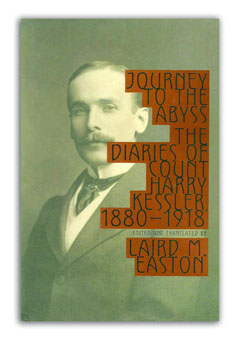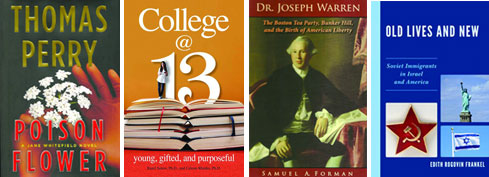Journey to the Abyss edited and translated by Laird M. Easton ’78 (Knopf)

Journey to the Abyss edited and translated by Laird M. Easton ’78 (Knopf)
Count Harry Kessler, a German diplomat who seems to have known everyone connected with the arts and politics of early twentieth-century Europe, left for Mallorca when the Nazis came to power. His diaries, which cover the period from the Belle Époque to the end of World War I, record the shock of the new, the violence of modern war, and the erasure of the old world. Easton, a professor at California State University, Chico, and Kessler’s biographer, translates this selection of Kessler’s diaries and provides historical background.

Poison Flower by Thomas Perry ’69 (Mysterious Press). In Perry’s seventh novel featuring Jane Whitefield, a Seneca guide who helps people escape their enemies and establish new identities, Jane breaks James Shelby out of a Los Angeles courtroom. Shelby, wrongly convicted of his wife’s murder, gets away, but criminals posing as police capture Jane and try to force her to give up the innocent man’s whereabouts. When she refuses, her captors put her up for auction to the enemies of her previous clients. She draws upon the strength of her warrior ancestors to resist her foes and bring about rough justice.
College at 13 by Razel Solow, MAT ’78, and Celeste Rhodes (Great Potential). College is challenging enough for high school graduates, but matriculating at an early age presents a unique set of problems. What are the effects of accelerating past your peers? How will you fit in socially? Solow, the director of the Center for Gifted Students and Education at Hunter College, traced the progress of fourteen young women through their college years and followed up on their lives ten years later. She found that gifted students have a greater sense of purpose and are happier in a place where they are challenged.
Dr. Joseph Warren by Samuel A. Forman, MD ’77 (Pelican). Dr. Joseph Warren, one of the leaders of the American Revolution, helped organize the Boston Tea Party, sent Paul Revere on his midnight ride, and died a hero at the Battle of Bunker Hill. In this new biography, a physician and president of Oak and Ivy Health Systems investigates Warren’s commitment to improving American medical education, the anti-British spy ring he ran out of his medical practice, his contributions to the Suffolk Resolves, and his alleged relationship with the wife of an enemy general as his source of military intelligence.
Old Lives and New by Edith Rogovin Frankel ’60 (Hamilton). In the Seventies, more than 200,000 Jews were allowed to leave the Soviet Union. Frankel, a political scientist at the Hebrew University of Jerusalem, interviewed people just after they had settled in the United States or Israel. “Some were motivated by a Zionism that had been nurtured during their childhoods in eastern Poland and the independent Baltic states,” she writes. “Others feared an economic downturn for themselves or their children.” Twenty-five years later, she re-interviewed the émigrés, now established in their adopted countries and looking back on their lives.
Fiction
Wildcat Play by Helen Knode, MA ’84 (Houghton Mifflin Harcourt). A year after a murder investigation that nearly cost her her life, Ann Whitehead leaves Los Angeles for a job on a wildcat oil rig in the San Joaquin Valley. When the accidental death of a crewmember turns out to be murder, Ann searches for the killer.
Poetry
The Poetry of India edited by Bhisham Bherwani ’90, BS ’92 (Atlanta Review). The author of The Second Night of the Spirit brings together an anthology of modern Indian poetry written in English, representing both the old guard and younger, emerging voices.
Non-Fiction
The Business of Empire by Jason M. Colby, PhD ’05 (Cornell). In the heyday of its power in the first half of the twentieth century, the United Fruit Company controlled much of Central America’s infrastructure and trade. By the time of the 1954 coup in Guatemala, the company was already a shadow of its imperial incarnation, yet the legacy of abandoned banana towns, unhealed racial wounds, and U.S. corporate power remains.
52 Small Changes by Brett Blumenthal ’95, BArch ’96, MBA ’04 (Amazon Encore). Blumenthal, the co-founder and CEO of Be Healthy Inc. and author of Get Real and STOP Dieting!, designs a program that encourages small yet meaningful changes—one per week for fifty-two weeks—that will lead to a healthier, more rewarding life.
Essayists on the Essay edited by Carl H. Klaus, PhD ’66, and Ned Stuckey-French (Iowa). Beginning with Montaigne and reaching to the present day, this anthology explores four centuries of writers’ meditations on the nature of the essay, a form variously described as heretical, methodically unmethodical, and the movement of a free mind at play.
The Nature and Culture of Rattan by Stephen F. Siebert, PhD ’90 (Hawaii). Used for house construction, furniture, basketry, and handicrafts, rattan canes are a valuable forest product in tropical Asia and Africa. A professor of international conservation and development at the University of Montana examines rattan biology and the lives of cane gatherers in three Southeast Asian villages.
Party Like a Culinista by Jill Donenfeld and Josetth Gordon ’03 (Lake Isle Press). A chef and a food writer team up to provide menus, recipes, and planning guides for perfect parties.
Brain Trust by Garth Sundem ’98 (Three Rivers). The author of The Geeks’ Guide to World Domination interviewed more than a hundred scientists—including Nobel, MacArthur, and National Medal of Science winners—to learn tips for solving real-world problems. “It turns out that the root of today’s best science is the passenger seat of scientists’ messy cars,” he writes. “In other words, the science in this book comes from the very real experiences and problems of scientists’ own lives.”
The Synthesis Effect by John McGrail ’74 (Career). A clinical hypnotherapist outlines a step-by-step process for creating a life of health, happiness, peace, and security and reaching a state of practical enlightenment.
Image Matters by Tina M. Campt, PhD ’96 (Duke). Using photographs of black German families taken between 1900 and 1945 and studio portraits of West Indian immigrants to Birmingham, England, taken between 1948 and 1960, the director of the Africana Studies Program at Barnard College, Columbia University, examines how photography plays a critical role in black people’s complex relationship to cultural identity and national belonging.
Candlestick Profits by Stephen W. Bigalow ’75 (Profit Publishing). Most investors have developed preconceived habits and expectations. The author of High Profit Candlestick Patterns explains how to use candlestick analysis—a technical trading program that originated in eighteenth-century Japan—to improve investment discipline.
Ask Your Inner Voice by James Wawro, JD ’69 (Ozark Mountain). A former international trial lawyer provides advice on how to call upon the voice within to obtain creative insights and wisdom.
Insights for Managers from Confucius to Gandhi by Harold Bierman Jr. and Donald Schnedeker, MBA ’84 (World Scientific). Bierman, the Noyes Professor of Business Administration, and Schnedeker, head of the Hotel school’s Nestlé Library, gather ideas of influential thinkers that are of special interest to managers.
Hard Interests, Soft Illusions by Natasha Hamilton-Hart, PhD '99 (Cornell). “There is little sentimentality about the United States among foreign policy elites in Southeast Asia,” writes a professor of international business at the University of Auckland. She argues that their belief in America as a benign power is driven by political and economic interests.


